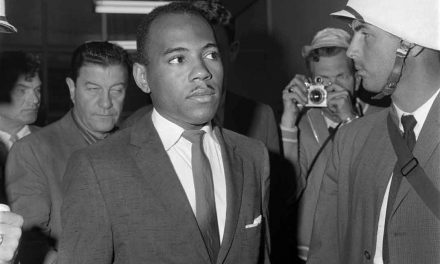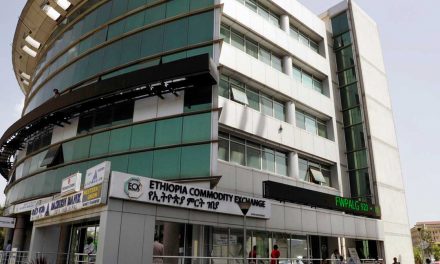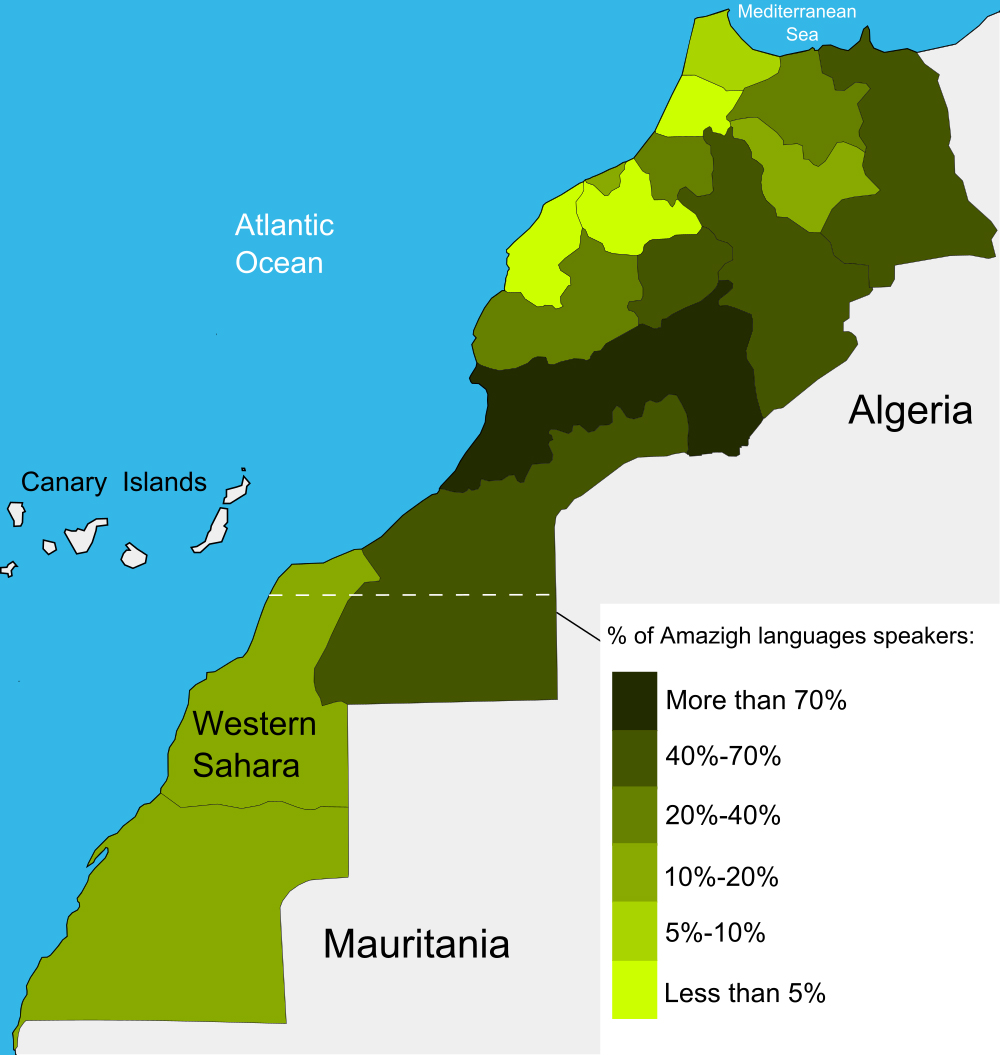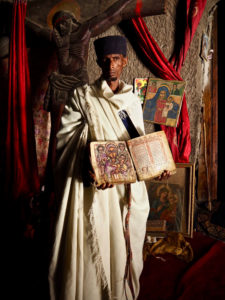
A priest shows his 900 year old bible still used for mass at Asheton Monastery in Lalibela, Ethiopia.
Religion is a deeply rooted aspect of Africa’s cultural life and there is nothing to suggest that this will change in the foreseeable future
There is no disputing the importance of religion to African life. In 2010, the Pew Forum on Religion and Life reported that Africa led the world in religious adherence. Religion played a deep, viscerally important role in people’s day to day lives and in their world view. It was not uncommon for as many as 90% of respondents to report that religion was important to them. Around half of Christians looked forward to the return of the Messiah in their lifetime, and nearly a third of Muslims believed that they would see the Islamic caliphate come into existence in theirs.
Religion in Africa is about more than transcendental beliefs. And arguably more than anywhere else, in sub-Saharan Africa, it is a defining presence in people’s lives. For many, religion provides a means of structuring the world’s uncertainties and a source of social services that poorly capacitated states struggle to provide. But for others, it is a bloodied fault line that drives people to contest for dominance over one another, and a retardant of social progress.
But what does the evidence say about the contribution of religion to Africa’s politics and social development? Such “evidence’” is hard to identify, gather and interpret; the frontiers of religious impact extend beyond the readily quantifiable, the superficially observed, the easily validated. An investigation of this kind is constrained by the unquantifiable nature of much that makes religion valuable, while on the other hand any qualitative investigation is limited by the sheer size of the continent. We have, therefore, focused on investigating the relationship between numbers of religious adherents and political and social development in Africa. These variables are easily obtained and relatively objective, valid, and reliable. We operationalised “religion” as percentage of affiliates to various religions by country1; we also included a measure of religious plurality.2 Political and social development was operationalised by variables measuring a range of civil liberties, conflict, health, wellbeing, and basic demographics.3
Our initial hypothesis was that increased religious affiliation would be related to an increase in social and political development (as represented by our set of variables). To test this hypothesis, and after checking the suitability of the data4, we calculated simple correlations between religious and the various political and social variables.5 The nature of the data meant that we could run Pearson correlations in the vast majority of cases.
The resultant correlations are shown as a correlation plot, below:6
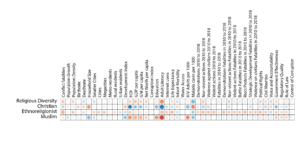
Percentage religiosity of total sub-region population, by faith.
The most prominent result was that, overall, the impact of religion on political and developmental outcomes was largely subdued and arbitrary. In view of the high level of religious adherence on the continent, this is perhaps surprising. What in Christian theology is termed the “Great Commission” – the spreading of beliefs and their infusion into life – is not evidenced in the outcome of our analysis. We suspected that this finding might be an artefact of the data, i.e. that Africa’s uniformly very high proportion of religious adherents does not offer much variability in the religion proxy variable. Put simply, we could not compare “religion” to “no religion”; all countries had a similarly high proportion of adherents. Our analysis was limited to comparing high to very high; comparing differing faiths; and different degrees of religious plurality. The model was, therefore, somewhat artificial.
Some interesting results were, however, to be found in examining the patterns in countries according to their predominant religious traditions, which included Christian, Muslim and ethnoreligious (the latter encompassing traditional and some syncretic beliefs).
Christian societies tend to do better in material and developmental terms. They score, as a group, particularly well on adult literacy. GDP per capita and GNI per capita tend to be on the higher side – by African standards. That said, they fare poorly on HIV prevalence. There also appears to be a fairly firm correlation with conflict fatalities and violence against civilians.
Muslim countries appear to evince a lesser degree of developmental wellbeing. There are particularly strong correlations here with the prevalence of malaria and with adult illiteracy. Indicators of GDP per capita, GNI per capita and literacy are weak. Interestingly, the prevalence of HIV infection was far lower than in predominantly Christian societies.
Those countries with a greater ethnoreligious orientation show developmental deficits that are not unlike their Muslim peers. The prevalence of malaria is notable, while negative correlations are to be found with Internet access and adult literacy. Interestingly, there are also strongly negative correlations with indices of violence.
What does this tell us?
Given the (perceived) importance of religion to shaping moral virtues, it is notable that a correlation between religious adherence and clean governance (or rather, perceptions of corruption) was lacking. Likewise, correlations with signifiers of violence and conflict were uneven and contradictory.
This carries a suggestion, paradoxically, that religion may not – in the socio-political sense – be decisive for the subcontinent. Paradoxical, too, because religion – Christianity in particular – has long been associated with a striving for democracy and “justice”. As theologian Professor John de Gruchy has put it: “In much of sub-Saharan Africa, the principles of unity, democracy and self-government were developed in the church long before they were even dreamed of in the state.” Given sub-Saharan Africa’s severe socio-economic and political difficulties, the failure to transfer these principles more absolutely in the public sphere may rightly be regarded as a significant shortcoming of its religious experience.

Corrplot of religious diversity and major religious affiliations by social and political variables.
It must be borne in mind that religion is but one element of a larger matrix of social identities, and determining its specific contribution to social dynamics is complicated by this. This is particularly the case in evaluating “religious” conflicts. This has attracted considerable global attention in recent years, not least because of the high-profile insurgencies mounted by such groups as Boko Haram in Nigeria and Cameroon and Al-Shabaab in East Africa, or by civil conflicts, such as in Sudan and in the Central African Republic (CAR).
However, a large body of research questions whether these conflicts do in fact have origins rooted primarily in religion. Professor Matthias Basedau of the German Institute of Global and Area Studies helps put this into perspective. In research published in 2017, he analysed 13 ongoing conflicts in Africa (as well as two others that were “less active”) at the time; of these, 10 could be said to have a religious dimension. These might be defined as theological, where conflict references religious ideas, as with the so-called Ntsilou¬lous rebels in Congo-Brazzaville, or intercommunal, as in Ethiopia and Kenya, where Islamic anti-government forces are in conflict with predominantly Christian states. In several conflicts – for example, South Sudan and Mozambique – there is no discernible religious dimension.
So religion can be a flashpoint. But it is important, Basedau remarks, to recognise the multiplicity of causes of conflict and the multi-layered nature of individual and communal identities. “Religion is only one aspect of these conflicts – they can also be ethnic conflicts, or conflicts over power or resources. There is no conflict based purely on religion,” he notes.
Crucially, faced with challenges to their stability, African states too often lack the capacity to intervene constructively to defuse them. Thus, Basedau continues: “Mundane factors such as weak states, insufficient government and international responses make states vulnerable to rebellion and insurgency, identity-based grievances of religious groups, and religious ideologies. Sometimes, outside support from religious extremists can add fuel to the fire and facilitate mobilisation, radicalisation, and gruesome violence.”
But the weakness of states also calls attention to a crucial role that religion plays in sub-Saharan Africa. Scholars, among them University of Pretoria’s Professor Johannes Hofmeyr, have documented how religious bodies were among the few institutions to retain some coherence as sub-Saharan Africa underwent its debilitating crises in the 1970s and 1980s. Often the most durable institutions – and, given the importance of religion to the subcontinent, in many ways the most respected – they were able to intervene on policy and governance questions with a rare authority, if not always perfect effectiveness.
South Africa is a particularly illustrative case. Despite its willingness to act harshly against dissent, the apartheid government needed to tread carefully in dealing with church protests. It claimed, after all, to be a “Christian” government. And so, the churches became an important site of political protest. In the post-apartheid era, they became vocal in protesting corruption and other governance pathologies. Also not to be underestimated is the role that a shared Christian faith – even if often nominal – played in the transition to democracy, by providing the protagonists with the rudiments of a common moral framework.
Elsewhere, religious leaders have taken prominent roles in decrying human rights abuses – as did Archbishop Janani Luwum of Uganda during the rule of strongman Idi Amin. Murdered by the government in 1977, his life is celebrated in his country with an annual public holiday.
Religious institutions and leaders have long been involved in opposing governance pathologies such as corruption and the abuse of office. In Zambia, a coalition of church groups – Catholic, Protestant and evangelical – were instrumental in stopping plans by then President Frederick Chiluba to rewrite the constitution to grant himself a third term. Continental bodies such as the All Africa Conference of Churches, along with the various national structures, have tried to participate in governance reform initiatives, such as the African Peer Review Mechanism.
Perhaps no field of activity has seen a more important contribution from religious organisations than peace-building: a striving for peace resonates with all Africa’s religious traditions. Thus, despite the profound ambivalence with which Mozambique’s then quasi-Marxist government had regarded the Catholic church, it was the latter institution that took a leading role in mediating an end to the civil war in the 1990s. In some diverse societies – such as Mauritius and Benin – religious organisations have taken the initiative of setting up consultative structures to facilitate inter-faith dialogue and forestall conflict. In sub-Saharan Africa, with some high-profile exceptions, religious diversity is managed well. Inter-communal tolerance, rather than intolerance, is the rule.
Dr Paula Roque, an expert in security issues with an emphasis on Angola and South Sudan, described the efforts of church structures in peace-building to Africa in Fact: “The South Sudan Council of Churches have always been at the heart of conflict resolution; at local level community disputes, and even lately as the main mediators of the IGAD peace process. In Angola, they played an important role calling for peace in the 1990s and at the end of the war were trying to mediate a direct process to end the war, but (opposition leader Jonas) Savimbi was killed and the military negotiated the peace process … In the DRC, the bishops were key last year in pushing for elections and demanding that Kabila step down.”
Maintaining probably the most comprehensive network across the continent, through its congregations and numerous church-linked charities, service and advocacy organisations, the Catholic church plays an important role here. “Overall, religion is a strong force for peace,” Mike Pothier of the Catholic Parliamentary Liaison Office in Cape Town told Africa in Fact. “Religious leaders often mediate and they seem to enjoy wide respect; sometimes even the politicians listen to them! Church institutions also play a part, from the high profile like St Egidio (which played a key role in mediating the end of the Mozambican civil war) to the everyday justice and peace structures that are found in most countries.”
Naturally, the intervention of religious structures in governance is often resented, and steps are sometimes taken to stop it. Roque noted that during times of peace, efforts were made to sideline their influence and reduce their capacity to mobilise. It should also be noted that the growth of “securitised” governance has implications for the work of religious groups on these issues. This is perhaps best illustrated in Ethiopia, where legal restrictions on the involvement of civil society in political work affect the ability of religious groups to do so. In Rwanda, government has ordered the closure of numerous small religious congregations, sparking concerns that the government is trying to assert control over the religious sector. There are disturbing signs that this brand of policy is spreading, creating a set of challenges for the region’s religious communities.
All of this shows a complex texture of the role of religion in sub-Saharan Africa and its “Great Commission”. Religion is a deeply-rooted aspect of Africa’s cultural life. There is nothing to suggest that this will change in the foreseeable future. Indeed, as the eminent historian Professor Philip Jenkins has argued, the life experience of millions of Africans that steers them towards an approach to religion is deep, fervent and at once personal and social.
Having considered these various discussion points, and having acknowledged the often nuanced and complex way in which religion interacts with the African socio-political reality, we come full circle to a point at which we again question quantitative data’s ability to capture this complexity. More creative methodologies may be required, based on innovative data. These might include measures such as altruism, forgiveness, community, and hope, for example. In so doing, the intangible quality of religious benefit might be glimpsed. In this way, the objectivity afforded by quantitative methods might be brought into alignment with what we know to be a vitally important aspect of the African cultural landscape.
1. Our data for religious affiliation was obtained from the World Religion Database. Todd M. Johnson and Brian J. Grim, eds., World Religion Database (Leiden/Boston: Brill, accessed August 2018).
2. Religious plurality was proxied by the World Religion Database’s religious diversity index, which is calculated using the Herfindahl Index, a measure used by many economists to indicate how market competition is spread among businesses in an industry.
3. Our data for social wellbeing was obtained from the World Bank Group, the World Religions Database, the Freedom in the World project, and Armed Conflict Location & Event Data Project (ACLED)
4. “Suitability” required checking that variables were sufficiently linear, and to conduct transformations where necessary.
5. We checked assumptions for all variables i.e. that they were not overly skewed; that outliers were removed; and that they were sufficiently linear.
6. Correlation plots were created using package CorrPlot. Taiyun Wei and Viliam Simko (2017). R package “corrplot”: Visualization of a Correlation Matrix (Version 0.84). Available from https://github.com/taiyun/corrplot




